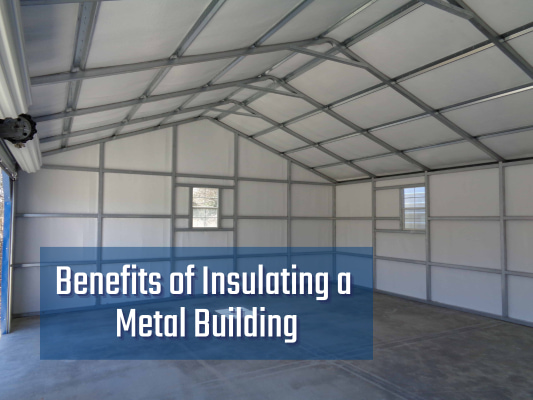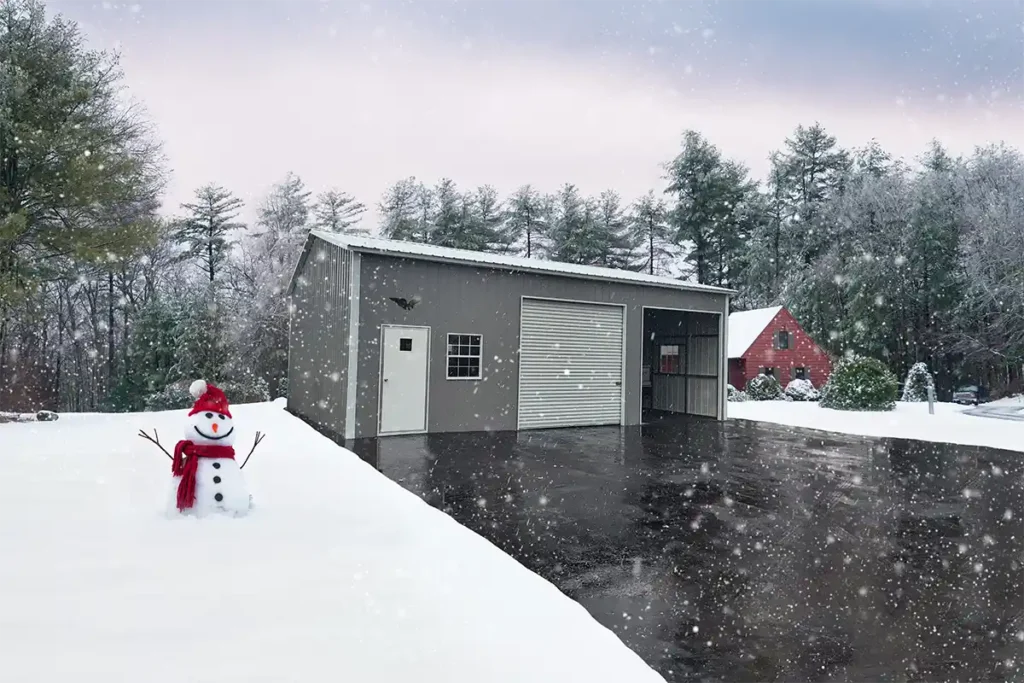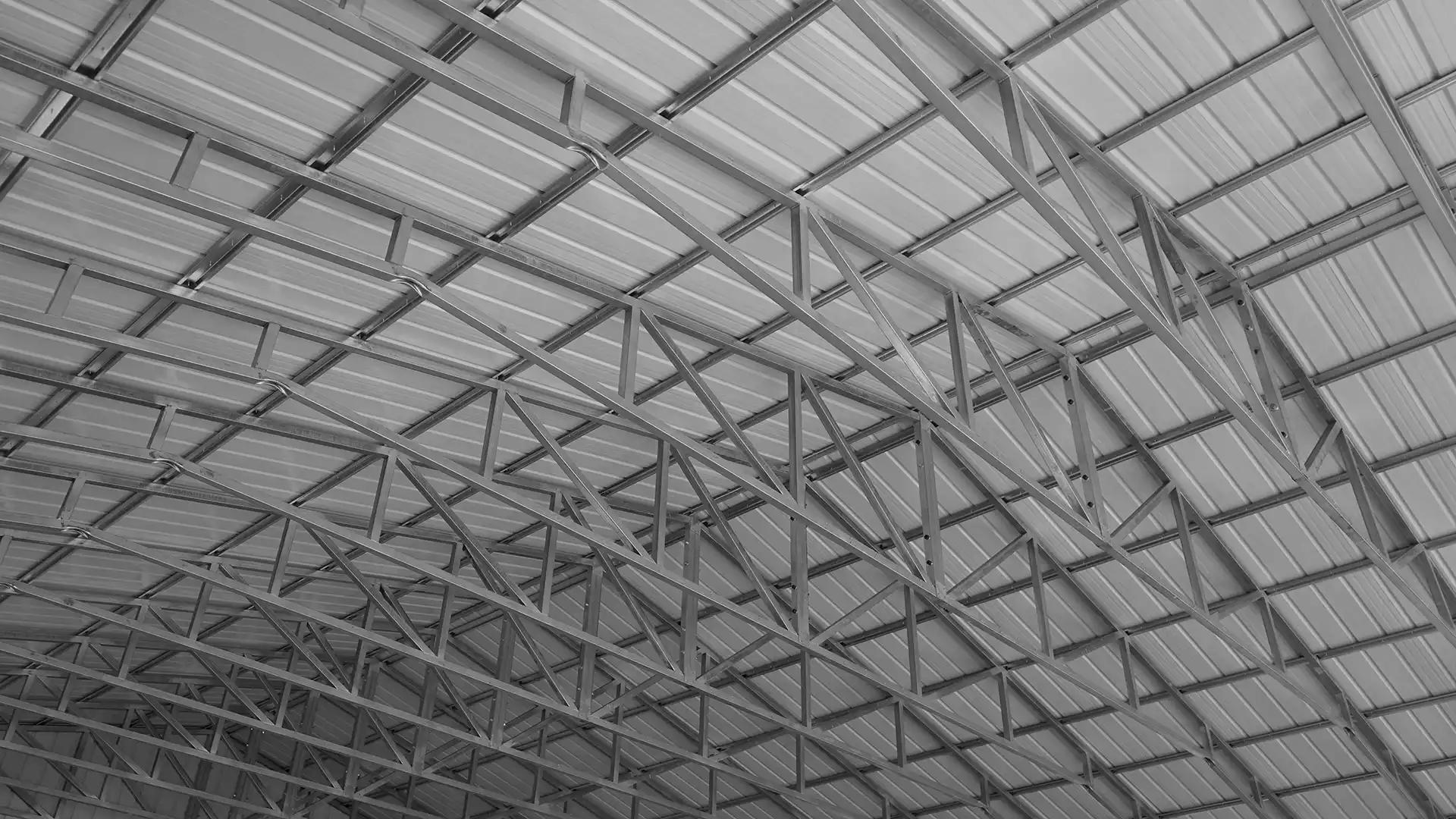In the world of construction and architecture, metal buildings have been gaining substantial popularity due to their durability, versatility, and cost-effectiveness. Whether used for residential, commercial, or industrial purposes, metal buildings offer numerous advantages. However, like any construction project, optimizing comfort and efficiency is paramount. That's where insulation for your metal building comes into play.
Join the metal building construction experts from Eagle Carports as we visit the importance of the often-overlooked aspect of metal building construction: insulation. From significant energy savings to enhanced comfort, insulating your metal building comes with a number of benefits that can save you both time and money.
Energy Efficiency
Metal building insulation offers several significant benefits when it comes to energy efficiency. These advantages can make a substantial difference in both residential and commercial metal structures.
Thermal Regulation
Steel building insulation helps regulate the temperature inside a building, reducing the need for excessive heating or cooling. This translates to lower energy consumption and reduced utility bills. During hot summers, insulation prevents excessive heat from penetrating the metal building, while in cold winters, it retains indoor warmth.
Reduced Heat Transfer
Metal buildings can be particularly susceptible to heat transfer. Insulation acts as a barrier, minimizing the heat flow from outside to inside, and vice versa. This means that your HVAC system doesn't have to work as hard to maintain a comfortable indoor environment, ultimately saving energy.
Year-round Comfort
With metal building roof insulation and the insulation of wall panels, occupants of the building can enjoy consistent temperatures year-round. Say goodbye to uncomfortably hot summers and chilly winters. This improved comfort not only enhances the quality of life but also boosts productivity in commercial metal garages and workshops.
Improved Comfort
Enhanced comfort is a direct result of effective metal building insulation. Here's how it contributes to a more comfortable living or working environment.
Temperature Control
Insulated metal panels maintain a stable indoor temperature. This means you can enjoy a cozy and comfortable space, regardless of the weather conditions outside. No more extreme temperature fluctuations that can make occupants uncomfortable.
Noise Reduction
Steel building insulation also acts as a sound barrier, reducing noise from both inside and outside the building. This is especially valuable in commercial settings where noise can disrupt productivity or in residential spaces where peace and quiet are essential.
Condensation Control
Metal building insulation helps control moisture and condensation, preventing dampness and mold growth. A dry interior is essential for comfort and health, and insulation plays a crucial role in achieving this.
Extended Lifespan of the Building
Insulation isn't just about immediate benefits; it also contributes to the long-term durability of a metal building.
Protection Against Corrosion
A proper metal building insulation system can act as a vapor barrier against moisture, which is one of the main culprits behind metal corrosion. By preventing rust and deterioration, insulation helps extend the lifespan of the metal building's structural components.
Reduced Wear and Tear
Stable indoor temperatures and moisture control provided by metal building insulation also reduce wear and tear on HVAC systems and other building components. This results in less frequent maintenance and replacement, ultimately saving money over time.
Enhanced Indoor Air Quality
Indoor air quality (IAQ) is crucial for the health and well-being of building occupants. Metal building insulation contributes significantly to improving the quality of air inside a steel building.
Air Filtration
Steel building insulation materials can act as an additional filtration layer, trapping airborne particles, dust, and allergens. This results in cleaner, healthier indoor air, especially important for people with respiratory conditions or allergies.
Moisture Control
Insulation helps regulate moisture levels within the building, preventing excess humidity that can lead to mold and mildew growth. Maintaining optimal humidity levels enhances air quality and prevents potential health issues associated with poor air quality.
Comfortable Breathing Environment
Clean, well-regulated indoor air creates a more comfortable and pleasant environment, benefiting the overall experience of building occupants.
Return on Investment (ROI)
Investing in metal building insulation yields a significant return on investment over time, especially if the building is occupied frequently.
Lower Operating Costs
Reduced energy consumption and maintenance costs translate into long-term savings, making the initial investment in metal building insulation worthwhile.
Increased Property Value
Well-insulated metal panels are more attractive to potential buyers or tenants, increasing the property's resale or rental value.
Environmental Benefits
Energy-efficient buildings have a smaller carbon footprint, contributing to a more sustainable future. This can be a selling point for environmentally conscious customers and investors.
Types of Metal Building Insulation
Several types of insulation can be used in metal buildings, each with its advantages and suitability for different applications.
Fiberglass Insulation
Fiberglass insulation consists of tiny glass fibers that are tightly packed together. It is available in rolls or batts. Fiberglass is cost-effective, easy to install, and provides good thermal insulation. It is also fire-resistant and resistant to moisture when properly installed with vapor barriers.
Spray Foam Insulation
Spray foam insulation is a polyurethane foam that is sprayed onto surfaces, where it expands and hardens. Spray foam provides excellent insulation and creates a barrier for moisture and air leaks. It can fill gaps and irregular spaces, offering superior energy efficiency.
Reflective or Radiant Barrier Insulation
Reflective insulation typically consists of layers of foil or other reflective materials. It reflects heat away from the building, making it suitable for warmer climates or for areas that have a predominance of sunny days. Reflective insulation is effective at blocking radiant heat transfer. It is lightweight and durable with a long lifespan. While effective at reflecting radiant heat, reflective foil alone may not provide enough thermal resistance (R-value) in extremely cold climates, therefore requiring additional insulation layers. To function optimally, reflective foil needs to be installed with an air gap, which can add complexity to the installation process.
Mineral Wool Insulation
Mineral wool insulation is made from spun rock or slag fibers and is available in batts, rolls, or loose-fill. It provides good fire resistance, soundproofing, and thermal insulation. It is also moisture-resistant.
Costs and Energy Savings Over Time
When making a decision about which insulation is best for your needs, you probably want to include an analysis of the costs and benefits over time. Insulating a metal garage generally offers a positive cost-benefit analysis given that you can significantly reduce energy bills through better temperature control. This reduction in energy expenses can offset the initial installation costs within a few years while providing additional benefits like improved soundproofing and reduced condensation. The exact payback period will depend on factors like the garage size, climate, insulation type, and energy prices in your area. Most homeowners can expect a positive return on investment by insulating their metal garage, especially if they use the space regularly and live in a climate with temperature fluctuations. While the initial cost of insulation can seem significant, the energy savings over time can quickly offset the upfront expense.
Fiberglass Insulation
The cost of using fiberglass insulation in a metal garage typically ranges from $0.50 to $1.50 per square foot. The price primarily depends on the insulation R-value and whether it is a single- or double-layer system. A basic single-layer R-13 system costs closer to $0.50 per square foot and a high-performance double-layer R-30 system costs closer to $1.50 per square foot. In addition to the material cost, you should factor in labor costs for installation, which can vary depending on the size of the garage and local rates.
Spray Foam Insulation
The cost of using spray foam insulation in a metal garage typically ranges from $1 to $4.5 per square foot depending on the type of spray foam--closed-cell or open-cell--the size of the garage, and local labor costs. Open-cell spray foam is generally $0.50 - $1.50 per square foot. Closed-cell spray foam is generally $1.50 - $3.50 per square foot. Closed-cell spray foam generally falls on the higher end of the price range but offers better insulation properties and moisture resistance. Even though spray foam is a more expensive insulation choice, it provides superior thermal insulation and energy savings.
Reflective Foil Insulation
Using reflective foil insulation in a metal garage offers a significant cost-benefit by effectively reducing radiant heat transfer, leading to lower energy bills and better temperature control. Typically the cost ranges from $0.50 to $2.20 per square foot depending on the type of reflective insulation, its R-value, and installation costs involved, making it one of the more affordable insulation options for metal buildings compared to other types like spray foam or foam board. The lightweight and flexible nature of reflective foil insulation allows for simple installation with minimal tools, potentially lowering labor costs. Overall, reflective foil insulation is a cost-effective and efficient choice for insulating a metal garage, especially in climates with hot summers, due to its ability to reflect radiant heat and reduce energy consumption.
Mineral Wool Insulation
Using mineral wool insulation in a metal garage offers a significant cost-benefit by providing superior thermal performance compared to other options like fiberglass, though it may cost more upfront compared to fiberglass. It has a higher R-value per inch, good moisture resistance, soundproofing capabilities, and fire resistance. The cost of using mineral wool insulation in a metal garage typically ranges between $1.50 and $2.10 per square foot. Mineral wool is generally more expensive than fiberglass insulation due to its higher R-value and potential fire-resistant properties. For example, for 200 square feet, your average cost would be $300 - $800; 500 square feet would be $700 - $1,200; 1,000 square feet would be $1,400-$4,000. Considering its long-term performance and potential savings on heating and cooling costs, the cost-benefit of mineral wool insulation can be very positive.
Installation Tips and Best Practices
Proper installation is a key element in the effectiveness of which insulation type you use. Choosing a moisture-resistant insulation is the first important step and then follow the manufacturer's instructions for your specific metal garage and insulation type. From there, we are providing some tips and best practices for installing your insulation.
Prepare the Surface
- Clean the metal panels thoroughly and address any gaps or imperfections with sealant before applying insulation.
- Thoroughly clean the ceiling to remove dust, dirt, rust, and any contaminants, ensuring a secure bond for the insulation material.
- Check for gaps or cracks and seal them with caulk or expanding foam.
- If necessary, install a vapor barrier depending on your climate to prevent moisture issues.
- You may need to install furring strips or metal framing to create a space for the insulation to fit properly
Safety Measures
Some insulation material, like fiberglass, has fibers that can irritate the skin and lungs. And, spray foam insulation requires proper ventilation. Prioritize safety by wearing appropriate personal protective equipment (PPE) including:
- gloves
- safety glasses
- a dust mask or respirator
- long sleeves
- pants
Be mindful of potential fall hazards when working at heights. Have the following:
- ladders and stability
- safety harnesses
- a spotter
Common Mistakes to Avoid
Here are some common insulation mistakes that you should avoid when installing insulation:
- Selecting the wrong insulation type
- Not joining seams on rigid foam or fiberglass: Always use tape to join seams after the insulation is done and is exposed
- Not taking proper consultation: Learn from others to avoid mistakes
- Not using enough insulation
- Improper insulation cutting: Accuracy matters when curring insulation and fitting the final plasterboard on the wall. There should be no gaps between the plasterboard and insulation.
- Blocking vents accidentally: If there are vents, be sure to keep them open.
Contact Eagle Carports Today for Metal Building Insulation
The benefits of metal building insulation are clear– from enhanced energy efficiency to improved comfort and extended building lifespan. If you're considering insulation for your metal structure, there's no better time than now to take action. Contact Eagle Carports today to explore your metal building insulation options.
Our experts in metal carports are ready to assist you in making your building more energy-efficient, comfortable, and durable. Don't miss out on the numerous advantages that proper insulation can offer.
Reach out to us today by calling 800-579-8589 or filling out the form below to get started.






